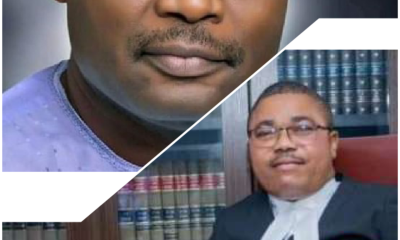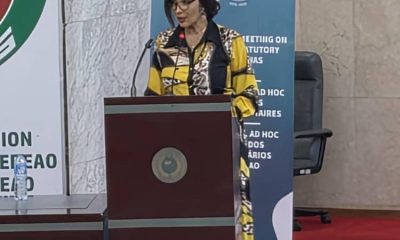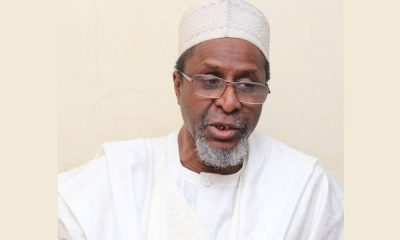OPINION
Why Silencing Nigeria’s Wailers’ Voices Is A Dangerous Move

BY ISAAC ASABOR
Nigeria, Africa’s most populous country, is no stranger to conflict between governance and public expectations. As democratic practices have evolved, so has the conversation about governance, transparency, and accountability. A recurring theme in the political landscape is a growing chorus of criticism directed at those in power, which is frequently dismissed as “wailers” by government supporters. However, a closer look at the situation reveals that this so-called wailing stems from concerns about misgovernance rather than an outright opposition to democracy itself.
Since 1999, when Nigeria returned to democratic rule, the country’s governance fortunes have fluctuated. Promises of development, economic prosperity, and improved welfare for citizens have frequently been undermined by widespread corruption, poor policy implementation, and a lack of accountability from political leaders. Over time, these issues have led to increased inequality, high unemployment rates, an economic downturn, and a growing sense of disenfranchisement among ordinary Nigerians.
Democracy, in its purest form, is intended to serve the people by ensuring that their voices are heard and their needs are met. Unfortunately, many Nigerian politicians appear to have misunderstood democracy as a system that allows them to pursue personal interests at the expense of those they swore to represent. The term “wailers” refers to the widespread dissatisfaction caused by the disconnect between the government and the governed.
In Nigeria’s political lexicon, “wailers” is used to mock and dismiss government critics. Those who speak out against poor governance, broken promises, or questionable policies are frequently grouped together and mocked as whiners by the ruling party’s supporters. But who are these “wailers”?
Wailers, in reality, represent a diverse group of concerned Nigerians who refuse to remain silent in the face of misgovernance. They are the voices calling for accountability, transparency, and good governance. Far from being a nuisance, their protest is critical to preserving democracy. In a functioning democracy, dissent and criticism are critical for holding leaders accountable. Wailing, as it is condescendingly referred to, is simply an expression of dissatisfaction that the democratic promises of good governance are not being kept.
The irony of the situation is that the government, which is supposed to be responsive to the needs of the people, frequently dismisses legitimate criticism as mere noise-making. Misgovernance disguised as democratic leadership has unfortunately become a common theme in Nigeria’s governance cycle. When policies fail, the economy tanks, or social services collapse, the government blames external factors or previous administrations while conveniently ignoring systemic issues within their ranks.
The government and its supporters misunderstand the essence of democracy when they dismiss legitimate concerns as wailing. In a democracy, the people are sovereign, and their cries should be taken seriously rather than mocked. The wailers are not enemies of the state; they are citizens fighting for democratic values that the government should uphold.
One of the most serious threats to democracy is silence in the face of injustice. If Nigerians stop wailing and expressing their dissatisfaction with the current state of affairs, democratic engagement will die. The fabric of democracy is woven with threads of dialogue, debate, and, yes, dissent. When citizens are too afraid or disillusioned to speak out, misgovernance flourishes unchecked.
The current state of Nigeria demands active citizen participation. The wailers, far from being misguided or obstructionist, are crucial to Nigeria’s democratic project. They are the individuals who dare to ask the hard questions, who refuse to accept mediocrity, and who push for a better Nigeria. Silencing these voices only perpetuates the cycle of misgovernance that has plagued the country for far too long.
For Nigeria’s democracy to truly work, there must be a shift in how criticism is viewed. Instead of dismissing critics as wailers, the government must engage in constructive dialogue. There needs to be a space for civil discourse where the concerns of the people are addressed, rather than dismissed.
Without a doubt, democracy thrives when there is an ongoing conversation between the rulers and the ruled. This conversation should be respectful, transparent, and aimed at improving governance. The current trend of labelling dissenters as wailers only deepens the divide between the government and the people. Nigeria cannot afford such division, especially at a time when the country faces numerous socioeconomic challenges.
The misunderstanding of the wailers in Nigeria is symptomatic of a larger issue: the disconnect between the government’s perception of democracy and the realities of misgovernance. As long as legitimate concerns are mocked and ignored, mismanagement will continue to thrive. It is time to reframe the narrative around dissent and to understand that those who speak out are not wailers but advocates for a better, more just, and more democratic Nigeria.
In the end, misgovernance and democracy are at odds with each other. The wailers, far from being a nuisance, are a crucial part of the democratic process, fighting for the very values that Nigeria’s democracy is supposed to uphold. Their voices must not only be heard but respected as part of the nation’s quest for genuine progress.
-
CRIME4 years ago
PSC Dismisses DCP Abba Kyari, To Be Prosecuted Over Alleged $1.1m Fraud
-
FEATURED4 years ago
2022 Will Brighten Possibility Of Osinbajo Presidency, Says TPP
-
FEATURED2 years ago
Buhari’s Ministers, CEOs Should Be Held Accountable Along With Emefiele, Says Timi Frank
-
BUSINESS & ECONOMY2 years ago
Oyedemi Reigns As 2023’s Real Estate Humanitarian Of The Year
-
SPORTS2 years ago
BREAKING: Jürgen Klopp Quits Liverpool As Manager At End Of Season
-
SPORTS2 years ago
Could Liverpool Afford Kylian Mbappe For €200 million? Wages, Transfer Fee
-
ENTERTAINMENT2 years ago
Veteran Nigerian Musician, Basil Akalonu Dies At 72
-
FEATURED2 years ago
Tribunal Judgement: Peter Obi Warns Of Vanishing Electoral Jurisprudence, Heads To Supreme Court
-
BUSINESS & ECONOMY2 years ago
Oyedemi Bags ‘Next Bulls Award’ As BusinessDay Celebrates Top 25 CEOs/ Business Leaders
-
FEATURED4 years ago
2023 Presidency: South East PDP Aspirants Unite, Demand Party Ticket For Zone



































